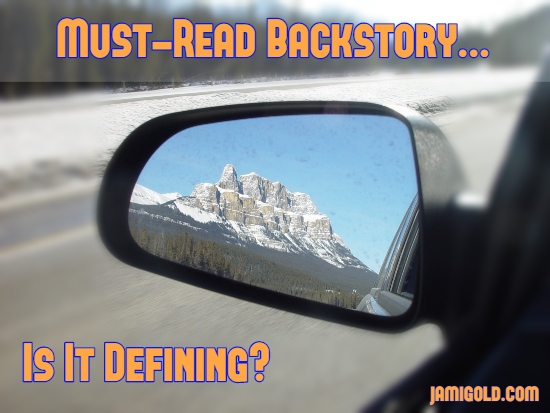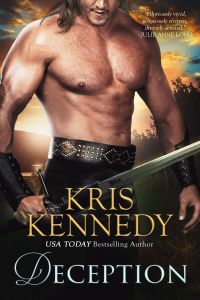Backstory: Avoid Info Dumping by Making It Essential: Part 2 — Guest: Kris Kennedy

One of my favorite aspects of developing a character’s arc is exploring their false belief because it’s key to the emotional heart of our story: a character’s struggles and journey toward change. Without a false belief established—that they then attempt to overcome—we’re more likely to have a hard time coming up with strong or interesting story events beyond just external plot obstacles.
If you’re not familiar with the concept, a character’s false beliefs are things the character believes that we, as the author, know not to be true. They’re not really unlovable, not everyone is out to get them, trust isn’t always a lie, etc.
However, their backstory wound has shaped their worldview so much that they believe their inaccurate conclusion to be logical. They’ve allowed it to define their fears and what they’re willing or able to do to achieve their goals and/or fulfill their longings.
We’ve talked before how to show a character’s false belief, but we’re going to dig deeper into the connection between backstory and false beliefs (or as Kris calls them, guiding principles) in today’s Part Two guest post on must-read backstory from Kris Kennedy. And Kris’s insights are especially helpful if our character doesn’t have a big traumatic wound in their past, as her term of defining moment might better explain how to apply these ideas.
If you missed Part One, she shared what it means to make backstory compelling. Now in Part Two, she’s focusing on the defining moment that leads to false beliefs and creates must-read backstories.
Please welcome Kris Kennedy! *smile*
*****
Crafting Must-Read Backstory:
Part Two
By Kris Kennedy
In the last post on Must-Read Backstory, we talked about how you can turn backstory into Story fuel by using it to compel your character to actions, both big and small.
This helps build more unique characters (characterization) and also adds tension for the reader.
Today, let’s dive into a second key strategy.
Key Two:
A Single, Defining Moment
Backstory is often rather…vague. Like a mist, it covers the past. They had “a tough life.” “Went to war.” “Lost a parent.” And so on.
And yet sometimes we go on and on, for paragraphs or maybe even pages, narrating the past with a plethora of minor, generic or uninteresting details, a sort of “My Hero 101” course, yet somehow never get to the heart of the thing.
There are a lot of traumatic histories in the pages of fiction. But trauma—however horrific you make it—is not as powerful to read about as a single instance of something that scarred your character forever. A formative moment.
A threshold in time when everything changed.
It doesn’t need to be the Biggest, Worst Thing Evah for the world at large.
It just has to have shaped your character forever.
Storytelling Insight: Romance & The Blues
The more specific you make this event, the more universal it becomes. It’s like a country or blues song that tells one person’s story, but in doing so, it’s relevant to us all. Paradoxically, it’s the details that make it universal.
But really, it’s not paradoxical. Because the more specific you get, the more emotional you get.
Emotions are universal. Shame, guilt, fear, anger…everyone has experienced them. They suck the reader in. We relate. And then…we care.
Who Is Your Character at the Beginning of the Story?
Whatever your protagonist’s overall backstory, be sure to craft a single moment in time that truly wrecked them.
What's made your character who they are at the beginning of the story? @RomWriteLab explores the defining moment of backstories Click To TweetIt can represent a lifetime of similar experiences, or it can be a standalone event that came in like a wrecking ball.
It can cement a worldview that was already developing, or it can destroy everything they once believed. But whether it’s the final straw or a new horizon, make sure it changes everything.
From that moment on, they were who they are in Chapter One. The person who steps on screen on Page One is a direct result of this single formative moment.
Then deploy that moment. Don’t reveal the details too soon, but do hint at it. Drop bread crumbs, so readers know something is up, and are dying to find out what it is.
Pro Tip: The best ways to drop bread crumbs? Read the last post on Must-Read Backstory, “Make It Compelling.”
How It Shapes Them:
Emotions, Beliefs, & Guiding Principles
Their Single Defining Moment will affect them in powerful, fundamental ways. They’ll have experienced such intense emotions they’re basically frozen in place, in that moment. And they’ll adopt…let’s call them guiding principles afterward.
How does the defining moment of our character's backstory shape who they are? @RomWriteLab shares her insights Click To Tweet“You can’t trust anyone.”
“I don’t have what it takes.”
“If you love someone, they’ll leave you.”
“Only the powerful win.”
Come up with a Defining Moment for your protagonist, then dig into what that experience made them feel. A single, powerful, visceral emotion.
Then identify a ‘guiding principle’ that fits with that, something they can use to interact with the world afterward. A belief about themselves and the world that will inform everything they do from them on.
An Example:
Turning Generic Backstory Into A Single Defining Moment
Say you have a protagonist who had a rough life, with an alcoholic, abusive father. Those are facts. It’s information. Relaying it won’t dredge up emotions in your reader. We’ll understand, but we won’t feel.
But give him Single Defining Moment that occurred the night his alcoholic father came home and beat his mother while the seven-year-old protagonist hid in the closet…?
Now you have deep, powerful emotions. And when you finally give the details of that night on the page, your reader’s going to feel them too.
What Now?
Go craft a single defining moment for your protagonist(s), then dig into what lessons they’ve learned from it.
What core beliefs did they form as a result? What big, painful emotions did they experience?
How could those beliefs and emotions affect the life choices they’ve made?
Stay tuned for more tips on how to craft must-read backstory!
*****
 Kris Kennedy is a USA Today bestselling romance author, story coach, freelance editor, owner of Romance Writing Lab & host of the craft-focused Romance Writers Summit (launching Fall 2019). She’s taught for Romance Writers of America, multiple online writing chapters, Writer University, and Savvy Authors.
Kris Kennedy is a USA Today bestselling romance author, story coach, freelance editor, owner of Romance Writing Lab & host of the craft-focused Romance Writers Summit (launching Fall 2019). She’s taught for Romance Writers of America, multiple online writing chapters, Writer University, and Savvy Authors.
Connect with Kris at her website or Twitter, or…
- To check out her books: kriskennedy.net
- To get fast, fun writing tips at irregular intervals, sign up for the Tips, Tricks, & Love newsletter
- To get all the updates about the Summit, sign up for the newsletter
- To get personalized attention for your stories, contact Kris for story coaching or developmental editing!
*****
Thank you, Kris! I love how clearly you tied together the concepts of backstory and guiding principles/false beliefs. Our story is so much stronger when elements connect and resonate, and as you said, that’s how we evoke deep, powerful emotions.
Our characters’ guiding principles aren’t just any random thing that they falsely believe to be true. And backstory wounds or defining moments shouldn’t be about just any random trauma.
False beliefs are a direct result of a character’s experiences in the past—their backstory. And the backstory needs a defining moment that creates those false beliefs/guiding principles.
We might have heard before that backstory is relevant only for how it affects our characters in the story here-and-now. Well, guess what?
That defining moment and resulting guiding principle is how backstory affects our characters during the current story. Ta-da! Instant essential backstory that’s a must-read and emotionally compelling. *smile*
Have you thought about your characters’ defining moments before? Does the advice to make it specific for more emotional impact make sense? Does understanding the connection between a backstory’s defining moment and false beliefs/guiding principles help you develop that aspect of your characters? Do Kris’s insights give you ideas for using backstory in your writing? Do you have any questions for Kris?
Pin It
Comments — What do you think?